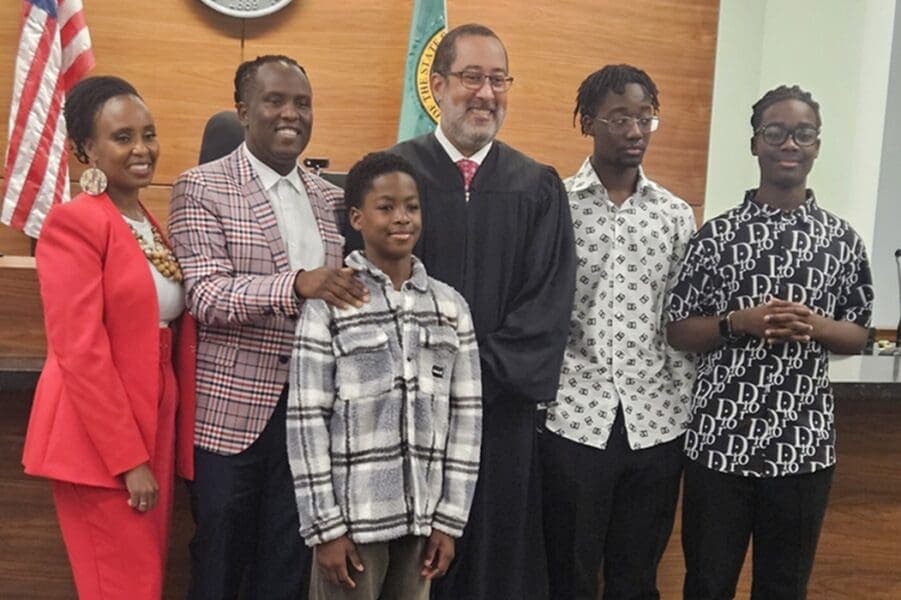We're loading the full news article for you. This includes the article content, images, author information, and related articles.
The adoption highlights the Kenyan diaspora's role in cross-cultural family building while spotlighting the urgent need for permanent homes for older children and sibling groups within the U.S. foster care system.

SEATTLE, United States – In a deeply emotional ceremony, a Kenyan couple officially adopted three African American brothers, marking the end of a long journey through the United States foster care system for the youths and showcasing the growing multicultural fabric of the Kenyan diaspora. The event took place on Friday, November 21, 2025, at the Judge Patricia H. Clark Children and Family Justice Center in Seattle’s Central District.
Stephen Wangui and Caroline “Shiku” Kimani, who emigrated from Kenya, welcomed Karl, 16, Mike, 14, and Rubben, 12, into their permanent family. The brothers had been under the couple's guardianship since 2022, a period that provided them with stability after months of uncertainty in foster care. The adoption is a significant moment, not only for the new family but also for the broader community, as it represents a rare and celebrated outcome where a sibling group is adopted together, particularly by caregivers of colour.
The adoption occurs against the backdrop of a strained U.S. child welfare system. In 2023, an estimated 527,180 children passed through the foster care system. According to the Adoption and Foster Care Analysis and Reporting System (AFCARS), there were 328,947 children in the system as of its fiscal year 2024 report. While many children are eventually reunited with their biological families, over 108,000 are eligible for adoption, often waiting years for a permanent home.
Older children and sibling groups face the most significant hurdles. Approximately two-thirds of children in foster care have at least one sibling also in the system. However, due to a shortage of families able and willing to take in multiple children, many are separated. Research indicates that placing siblings together leads to lower risks of failed placements and provides crucial emotional support. For Karl, Mike, and Rubben, being adopted together preserves their most constant bond. The average age of a child in foster care is over eight years old, and as they get older, their chances of adoption decrease significantly. Each year, more than 15,000 young people "age out" of the system without a permanent family, facing higher risks of homelessness, unemployment, and poor educational outcomes.
This adoption is a poignant story within the Kenyan community in the Seattle area. Washington state is home to a significant Kenyan population, estimated at 8,753 residents, with King County, where Seattle is located, having the largest concentration at 4,754. The region hosts a tight-knit community with cultural associations and community groups. For this community, the Wangui-Kimani family's story is a powerful example of extending Kenyan values of family and community into a new, cross-cultural context.
Stephen and Shiku have expressed their commitment to creating a home that honours both the boys' African American heritage and their own Kenyan roots. “In Stephen, they have a role model they can look up to,” Shiku stated, emphasizing their goal to build a home where the boys feel supported and connected to their identity. This blending of cultures speaks to the broader conversation around transracial adoptions in the U.S. While data shows that such adoptions are increasing, they often involve Black children being adopted by white families. The adoption by a Kenyan couple offers a different narrative, one rooted in a shared, though distinct, Black identity.
The final court proceedings were presided over by a Judge Ferguson. The boys’ longtime social worker, Allison Monsen of the Washington State Department of Children, Youth and Families (DCYF), was present and visibly emotional. The DCYF is the cabinet-level agency responsible for child welfare in the state. In 2024, the agency facilitated the adoption of 654 foster children in Washington. Monsen, who supported the brothers through the termination of parental rights a year prior, noted the rarity and significance of the moment. “It’s so lovely to see it come full circle,” she said, her voice trembling.
The Judge Patricia H. Clark Children and Family Justice Center, where the adoption was finalized, is a King County facility that houses the juvenile court and related services, designed with the goal of supporting youth and families. For the Wangui-Kimani family, it was the site of a new beginning. Over the past three and a half years under the couple's care, teachers and caseworkers have noted the brothers' emotional, social, and academic growth. Their story is a testament to the transformative power of stability and love, creating a unique Kenyan-American family and a powerful symbol of hope that crosses continents and cultures.
Keep the conversation in one place—threads here stay linked to the story and in the forums.
Sign in to start a discussion
Start a conversation about this story and keep it linked here.
Other hot threads
E-sports and Gaming Community in Kenya
Active 9 months ago
The Role of Technology in Modern Agriculture (AgriTech)
Active 9 months ago
Popular Recreational Activities Across Counties
Active 9 months ago
Investing in Youth Sports Development Programs
Active 9 months ago